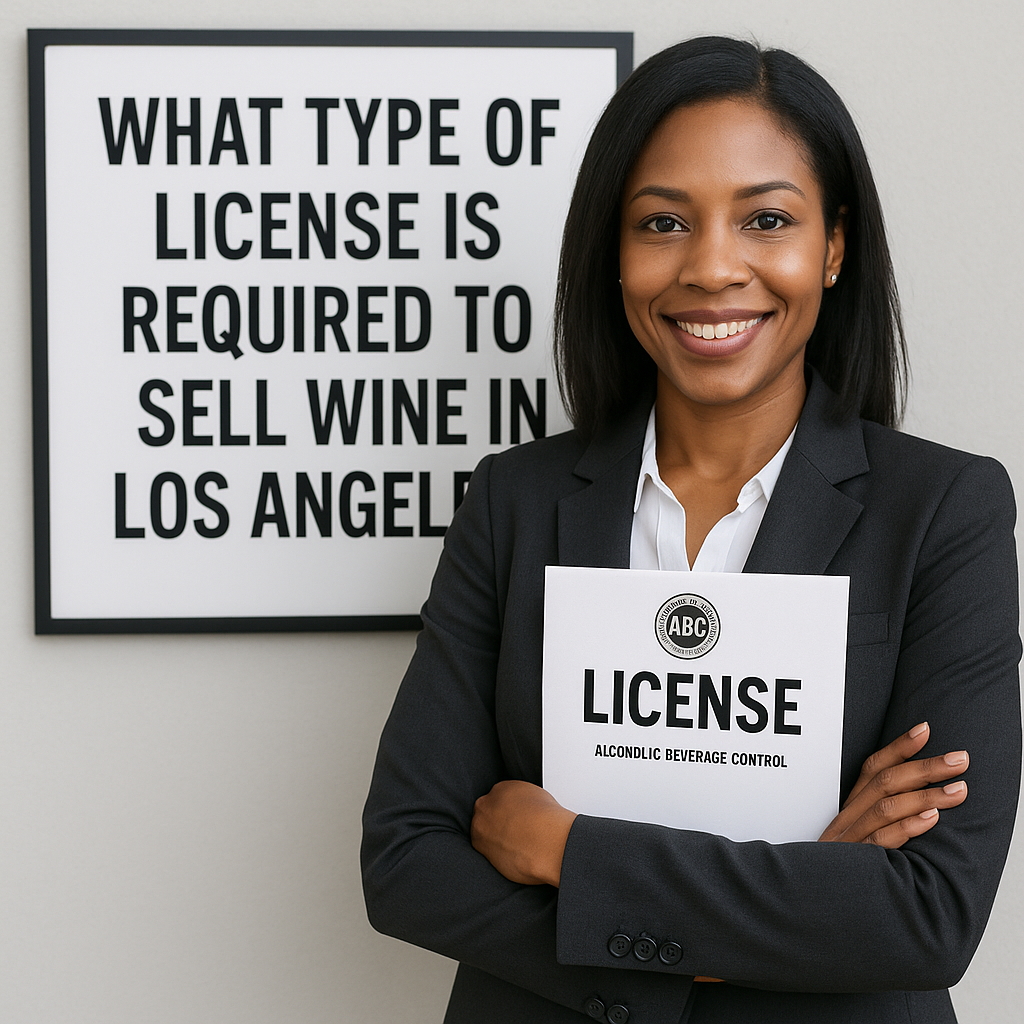To sell wine in Los Angeles, a specific type of alcohol license is required, issued by the ABC (California Department of Alcoholic Beverage Control). Below are some key license types that may be necessary for selling wine.
Type 20 License (Off-Sale Beer & Wine):
This license permits the sale of packaged (bottled or canned) beer and wine only. Consumption is strictly off-premises, meaning customers must purchase the products and consume them elsewhere, such as at home or on their premises. On-site consumption or service is strictly prohibited.
You may not open, serve, or sell wine or beer for immediate drinking or in a bar-like setting. Additionally, spirits (e.g., whiskey, vodka, etc.) cannot be sold under this license—a Type 21 License is required for that.
Source: https://www.abc.ca.gov/licensing/license-types/
Type 21 License (Off-Sale General):
This license allows the sale of all types of alcoholic beverages—including beer, wine, and distilled spirits (such as whiskey, vodka, rum, etc.)—in sealed containers for off-premises consumption only. Customers may purchase but cannot consume the alcohol on the premises. This license is commonly held by liquor stores, convenience stores, and supermarkets. Note: On-site consumption, tasting, or opening bottles is strictly prohibited.
Source: https://www.abc.ca.gov/licensing/license-types/
Type 41 License (On-Sale Beer & Wine—Eating Place):
This license allows restaurants to sell and serve beer and wine for on-site consumption, provided they operate as a bona fide eating place, meaning the establishment must serve full meals regularly and have a functioning kitchen. It does not allow the sale of distilled spirits like whiskey or vodka. This license is commonly used by sit-down restaurants, cafés, and some bistros. Note: Food service must be the primary business, not alcohol sales.
Source: https://www.abc.ca.gov/licensing/license-types/
Type 47 License (On-Sale General—Eating Place):
This license authorizes a bona fide eating establishment (such as a full-service restaurant) to sell and serve beer, wine, and distilled spirits (e.g., whiskey, vodka, rum) for on-site consumption.
Key Features:
- On-Premises Consumption: Allows customers to consume beer, wine, and spirits on the premises.
- Off-Sale Option: Permits beer and wine to be sold for off-site consumption, but not spirits.
- Food Requirement: The business must operate as a legitimate restaurant with a functioning kitchen and offer full meals regularly.
- Minors Allowed: Customers under 21 may be present as long as alcohol is not the primary focus of the establishment.
Approximate Fees:
- Application Fee: ~$7,320 (may vary based on priority status and location)
- Annual Fee: ~$1,205 to $1,505 depending on the county
Important Notes:
- Not suitable for bars without food service.
- Alcohol sales must not outweigh food sales in intent.
Source: California ABC License Types
Type 02 License (Winegrower):
The Type 02 License is issued by the California Department of Alcoholic Beverage Control (ABC) and is designed specifically for wine producers—also known as winegrowers. This license authorizes the licensee to produce, blend, store, bottle, and sell wine and brandy made from grapes or other fruit.
Key Features:
- Production: Allows for the manufacture, blending, and fermentation of wine and brandy.
- Storage & Bottling: Licensees may store, bottle, and package wine on-site.
- Wholesale Sales: Permits wholesale distribution to other licensees (such as retailers or restaurants).
- Retail Sales (Direct to Consumer):
- Allows for on-site tastings and sales to the public.
- May operate a tasting room and sell direct-to-consumer on the premises.
- May also ship wine directly to California residents (with proper permits).
- Multiple Locations: Can have branch offices or satellite tasting rooms under specific conditions.
Restrictions:
- Cannot sell beer or distilled spirits under this license.
- Must comply with federal winemaking regulations (TTB license also required).
Typical Users:
- Vineyards
- Wineries
- Wine cooperatives Source: ABC License Types – California Department of Alcoholic Beverage Control
YouTube video link:
youtube.com/watch?v=BOaX9D-lzh4&embeds_referring_euri=https%3A%2F%2Fchatgpt.com%2F&source_ve_path=Mjg2NjY
California Alcohol License Comparison Table
License Type |
License Name |
Sales Type |
Allowed Beverages |
Food Required? |
On-Site Consumption |
Off-Site Sales |
Suitable For |
Type 20 |
Off-Sale Beer & Wine |
Retail (Off-Sale Only) |
Beer & Wine Only |
❌ No |
❌ Not Allowed |
✅ Yes |
Convenience Stores, Grocery Stores |
Type 21 |
Off-Sale General |
Retail (Off-Sale Only) |
Beer, Wine & Distilled Spirits |
❌ No |
❌ Not Allowed |
✅ Yes |
Liquor Stores |
Type 41 |
On-Sale Beer & Wine – Eating Place |
On-Sale with Food |
Beer & Wine Only |
✅ Yes |
✅ Allowed |
❌ No (Limited) |
Cafés, Small Restaurants |
Type 47 |
On-Sale General – Eating Place |
On-Sale with Food |
Beer, Wine & Spirits |
✅ Yes |
✅ Allowed |
✅ Beer/Wine Only |
Full-Service Restaurants, Bars |
Type 02 |
Winegrower |
Production & Wholesale/Retail |
Wine & Brandy Only |
❌ No (except tasting rooms) |
✅ Tasting Rooms Allowed |
✅ Yes |
Wineries, Vineyards, Producers |
Quick Notes:
- Types 20 & 21: Off-site sales only—consumption is not allowed on premises.
- Types 41 & 47: On-site sales and consumption allowed, but must be tied to food service.
- Type 02: For wine producers—allows wine manufacturing, on-site tasting, and direct-to-consumer sales.
Conclusion:
If you only want to sell bottled wine for off-site consumption, a Type 20 or Type 21 license would be appropriate. However, if you plan to serve wine in a restaurant setting, you’ll need a Type 41 or Type 47 license. I can also guide you through the application process if you need help.
Source:
California Department of Alcoholic Beverage Control (ABC)
https://www.abc.ca.gov
Credit: www.abc.ca.gov

